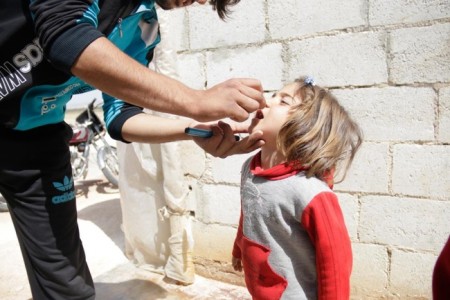A rare success story amid the violence and sieges on food and medicine in Syria….
Volunteers have braved the danger of attacks to vaccinate about 1.4 million children against polio since January.
In October international health organizations noted the re-emergence of polio after 15 years, with 36 confirmed cases. They warned that tainted water, dysfunctional sanitation systems, and the millions of displaced Syrians could foster a region-wide epidemic. Opposition activists said the Assad regime was preventing vaccination campaigns in insurgent-held areas.
A coalition of nonprofit organizations responded by recruiting and deploying more than 8,000 volunteers in northern Syria, winning the cooperation of insurgents to administer the vaccine to children under age 5.
Four volunteers have been killed, but there has not been a confirmed case of polio in almost five months.
The Polio Control Task Force, based in southern Turkey, includes the Syrian American Medical Society, the opposition-linked Assistance Coordination Unit, and about half a dozen other groups. It is supported by local organizations, international aid groups, and foreign governments.
After receiving vaccines from the Turkish Red Crescent at the Syrian border, the Task Force transports them to storage hubs, health clinics, and volunteers in seven provinces — Aleppo, Idlib, Hama, Deir Ez Zor, Latakia, Raqqa, and Hasaka.
To give the three rounds of vaccine to each child, the volunteers have had to face the risk of airstrikes, including barrel-bombs.
Speaking of the death of a volunteer who died in Aleppo from a bomb, Dr Abd al-Rizzaq Darweesh says, “Of course I’m scared. All of us are scared. But there’s a job that needs to be done.”
Darweesh said most insurgents had been cooperative. While there have been a few instances where staff and volunteers were kidnapped or detained, armed groups — though not the Islamic State of Iraq and as-Sham — had helped task force members find safe passage or convince reluctant civilians that the vaccine is safe. Darweesh added that many fighters have had their own children vaccinated.
UNICEF and the Task Force estimate that as many as 400,000 children in besieged and hard-to-reach areas of Syria are still in need of vaccination.

